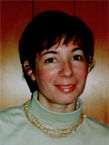Eugenia Etkina
 I was born in Moscow, Soviet Union.
I was born in Moscow, Soviet Union.
As long as I remember myself, I wanted to be a teacher. Maybe because this was the only profession I was familiar with - my mother was a math teacher, my father - a physics professor, my grandmother - a biology teacher. But there was another reason for this. I did not like school. I was a very unhappy student, and I could see what the teachers were doing wrong to make me feel that way. So I thought, when I become a teacher, I would be different, and my students would be happy. As I was growing, ideas of what to do differently were shaping up and by the time I graduated from the Physics Department of Moscow State Pedagogical University, I knew very well what kind of teacher I would like to be. The rest of my life was putting this image to work.
The ideas of human constructivism were unknown in the Soviet Union at that time, but these were the ideas that I came up with on my own and wanted to put into practice of physics and astronomy teaching. I wanted my students to understand why they were learning what they were learning, what are epistemological connections between different pieces of physics they learned every day, and how to learn them best. I conducted clinical interviews with the students (I did not know that they were called that way but this is what I did) to learn they way they were thinking and developed Socratic questions to lead them through the physics course. I developed materials for astronomy courses that provided students with observational data and called for explanations and predictions. I taught them to draw concept maps and visualize problems. There was no theory leading me through this work, so I just tried what made sense to me and measure gains of my students on different tests.
After my family moved to New Jersey I was invited to teach in the Physics Department, at Rutgers University. I spent two years developing, teaching, and coordinating the introductory physics course for students at-risk - women and minorities. It was an unforgettable experience. I started reading books written by Joseph Novak and Joel Mintzes, research papers in physics education, and tested these ideas in our course. Research that we did demonstrated that the methods were very successful, our at-risk students outperformed students from the traditional course being originally much weaker.
Later I was offered a job in the Graduate School of Education. I thought that being a science professor I could move towards my goal (making learning a happy experience) much faster by educating future teachers. I also discovered another area where I could make a difference - helping prospective and inservice elementary teachers learn science. This work reinforced my constructivist approach to teaching, shaped up the methods and also posed new questions that I am searching the answers for.
I am trying to help people to learn how to teach physics at different levels: elementary, high school, undergraduate in a way when children/students learn, not only teachers teach. I hope that my students at all levels will apply this philosophy in their teaching too.
Tell me more about this technique:

